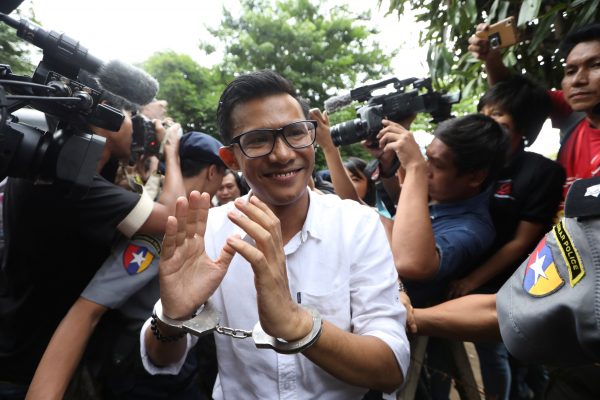As an elected government that seems at least partially committed to democratic values, the ruling National League for Democracy (NLD) is not directly cracking down on the media. Instead, it is softly repressing and stigmatising the media outlets that it thinks are unfairly critical of the government. This soft repression is stymieing the development of Myanmar’s young independent media.
The NLD and its chair Aung San Suu Kyi were the darlings of the press before they came to power. The support they received from local media was so overwhelming that several outlets repeatedly told the public to go and vote in November 2015 — implicitly for the NLD.
In contrast, relations between Aung San Suu Kyi and the international media that loudly rejoiced her release from house arrest in November 2010 had soured by late 2012. They criticised her slow response to the Rohingya issue, the outbreak of inter-religious violence and the government’s handling of the Kachin conflict.
While Aung San Suu Kyi was criticised internationally from 2012 through 2015, most local media outlets pointed the finger at then president Thein Sein, who in turn accused the media of instigating the violence.
When the 2015 election drew closer, local media outlets joined the opposition and made sure that the election would go ahead under free and fair conditions. They monitored and criticised the Thein Sein-appointed Union Election Commission when its work was deemed unprofessional, biased and insufficient. They also reported against the monk-led Ma Ba Tha (Organization for Protection of Race and Religion) when it blatantly played the Buddhism card in favour of Thein Sein.
The NLD won the election and came to power with high expectations from the press, which had already tasted greater media freedom under Thein Sein. But it has been disappointed.
Two issues are particularly disturbing. The first is the use of criminal defamation law. NLD government officials and their supporters frequently use the notorious but powerful ‘defamation’ clause in Section 66 (d) of the 2013 Telecommunications Act against their critics.
Several people have been jailed for defaming Aung San Suu Kyi on Facebook. Notably, the Yangon Region government led by Chief Minister Phyo Min Thein, close to Aung San Suu Kyi, used the defamation clause in November 2016 and the ‘public fear or alarm’ clause in Section 505 (b) of Myanmar’s Penal Code in October 2018 to sue Eleven Media.
More harm has been done by the controversial case of two Reuters journalists Wa Lone and Kyaw Soe Oo. The duo, who extensively covered the Myanmar military’s atrocities against Rohingya ‘terrorists’, were detained in December 2017 and jailed for seven years in September 2018 under Section 3.1 (c) of the 1924 Official Secrets Act for the collection of state secrets.
Aung San Suu Kyi contends that the court was independent and followed due process, and that the verdict was not a violation of freedom of expression per se.
The second issue is the emergence of an anti-media populist narrative. This narrative was previously circulated in a cruder form by Ma Ba Tha and Buddhist nationalists who accused the media of pro-Muslim and Western bias. The same anti-media narrative is now being re-produced in a more nuanced form by NLD officials in public and by their supporters on social media.
The official and societal narratives that criticise the media have emboldened each other in recent months, especially after local and international media stepped up their criticism of the Reuters verdict and the NLD government. The NLD’s previously sweet relations with local media turned sour soon after it started governing a war-torn, dictatorship-stricken Myanmar.
Media coverage on the ‘terrorist’ insurgency launched by the Arakan Rohingya Salvation Army in October 2016 and again in August 2017 brought about a watershed moment in the relations between the NLD and its supporters, on the one hand, and local and international media on the other. The 2017 attacks were followed by a heavy-handed ‘clearance’ operation by the Myanmar military that culminated in the exodus of hundreds of thousands of Rohingya refugees into neighbouring Bangladesh.
Over the past two years, international media, often assisted by their local correspondents and joined by other local media, have strongly criticised Aung San Suu Kyi and her government for their slow response and weak accountability amid the heavy-handed operation against the Rohingya ‘terrorists’.
Myanmar questions the ‘veracity’ of the news on the atrocities, which the international community have variously condemned as amounting to ethnic cleansing, war crimes, genocide and crimes against humanity. The few instances in which international media outlets, foreign leaders and Rohingya activists use or share misleading pictures and news are immediately red-flagged by Myanmar.
Recently, Myanmar President Win Myint pointed out that the press sometimes violates the country’s News Media Law. Aung San Suu Kyi aired her mistrust of the traditional media and expressed her ambivalence about the difference between traditional and social media. And Information Minister Pe Myint rejected the notion that there has been a decline in press freedom, questioning the media’s so-called independence from their ‘funders’ and labelling them as biased.
On Facebook, the media is increasingly coming under pressure from a home-grown populist narrative launched by pro-NLD e-democrats and keyboard warriors. Such groups stigmatise journalists and activists like Maung Saung Kha who campaign for press freedom and the release of the two Reuters journalists as unpatriotic dollar-eaters and stooges of the West.
The future of Myanmar’s press freedom does not look bright. And it may even deteriorate further if the NLD and its supporters move to step up media repression as another general election scheduled for late 2020 draws near.
Nyi Nyi Kyaw is Visiting Fellow in the Myanmar Studies Programme of the ISEAS–Yusof Ishak Institute.

